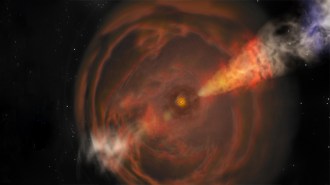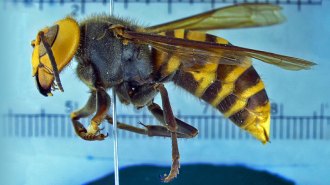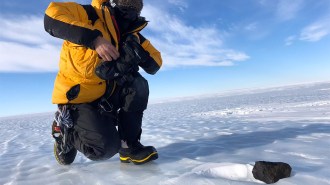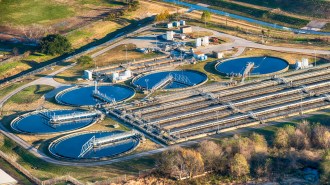Uncategorized
-
 Space
SpaceA weird cosmic flare called the ‘Cow’ now has company
Scientists have now found three similar luminous, short-lived bursts of light, part of a class known as fast blue optical transients.
-

We have learned much, and need to learn much more
Editor in chief Nancy Shute writes about the challenges of covering emerging scientific discoveries in the time of COVID-19.
By Nancy Shute -

-

Special Report: Fighting the Virus
This special report investigates what it will take to regain some sense of normalcy: Safe and effective treatments and a vaccine, along with testing and contact-tracing systems.
-
 Life
LifeMore ‘murder hornets’ are turning up. Here’s what you need to know
Two more specimens of the world’s largest hornet have just been found in North America.
By Susan Milius -
 Genetics
GeneticsGenetic risk factors for Alzheimer’s also raise the risk of getting COVID-19
People who have the APOE4 genetic variant appear to be more vulnerable to the disease, but it’s unclear why.
-
 Life
LifeNeon colors may help some corals stage a comeback from bleaching
When some corals bleach, they turn bright colors. Stunning hues may be part of a response that helps the corals recover and reunite with their algae.
-
 Planetary Science
Planetary ScienceMeteorites might be more likely to strike near the equator
Meteorites from Antarctica have helped scientists assess the total number likely to hit Earth every year — and where they are most likely to fall.
By Shannon Hall -
 Archaeology
ArchaeologyA biblical-era Israeli shrine shows signs of the earliest ritual use of marijuana
Chemical analyses reveal a residue of cannabis and animal dung on an altar from a biblical-era fortress in use more than 2,700 years ago.
By Bruce Bower -
 Climate
ClimateHow more powerful Pacific cyclones may be fueling global warming
Increasingly strong storms in the North Pacific may be speeding up the fast-moving Kuroshio Current — which could bring more heat to high latitudes.
-
 Health & Medicine
Health & MedicineWastewater could provide up to a week of warning for a COVID-19 spike
A new study adds to evidence that sewage may serve as an early warning signal that the coronavirus has hit a community.
-
 Space
SpaceSpaceX’s astronaut launch marks a milestone for commercial spaceflight
Two NASA astronauts aboard the privately built Crew Dragon capsule are the first to be sent into orbit from U.S. soil since 2011.